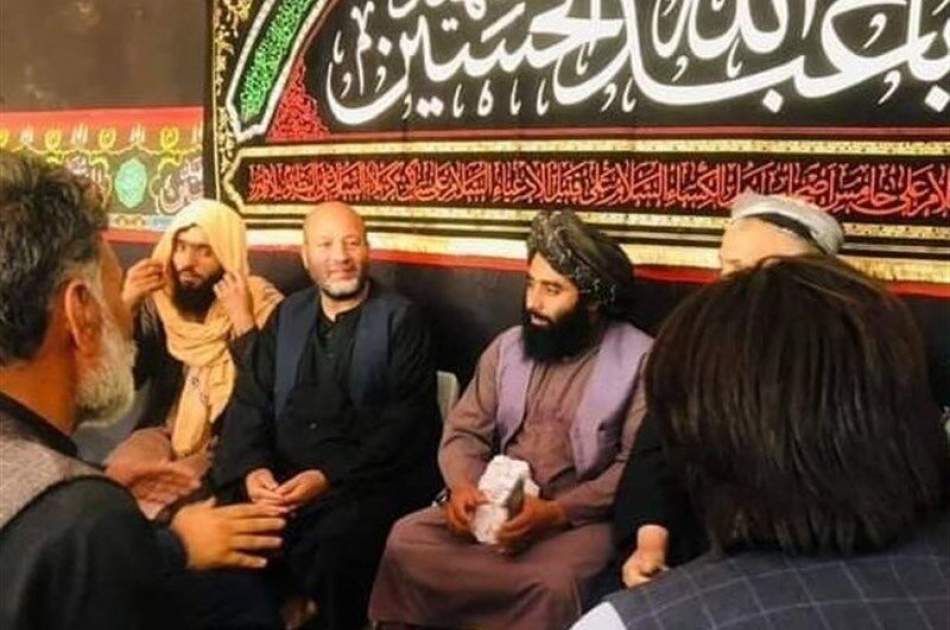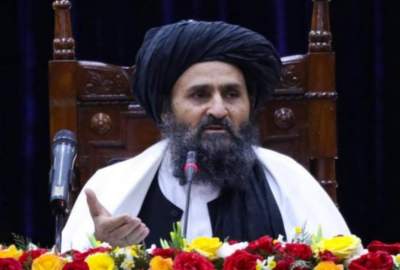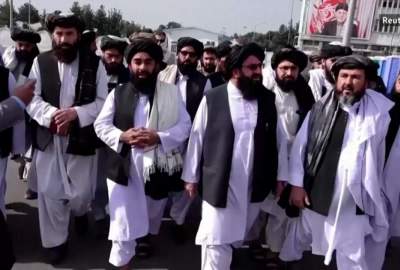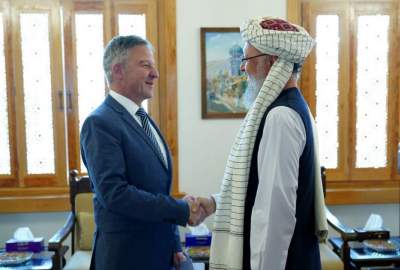Afghan Voice Agency (AVA) - Today's view: Patience, peace and constructive cooperation with the regime is the only way for the country's Shia community to achieve its legitimate demands in this field, and there is no doubt that the regime, both in the current situation and in the future, will It needs the cooperation and support of all social, political, ethnic and religious groups, and to achieve this, it is necessary to pay attention to their legitimate demands.
Publish dateMonday 21 November 2022 - 11:24
Story Code : 261233
The person in charge of the Shiite Demands Follow-up Commission says: The people of the Shiite community should be patient; because with each passing day, positive steps are taken for their demands.
Sayed Hussain Alami Balkhi said in an exclusive interview with AVA that the continuous dialogue with the Islamic Emirate is going on in different dimensions.
He explained: basic discussions on four important issues (preserving the legitimacy of the Jafari religion, applying the Shia personal status law in the courts, the participation of the Shia community in the country's political decision-making, and the presence of specialists and cadres of the Shia community in various levels of the administrative system, including membership in Cabinet) is ongoing and has had positive results so far.
Mr. Balkhi added: The Islamic Emirate has promised that with the end of the caretaker government, the demands of the Shiites will be addressed.
According to him, the Islamic Emirate has also promised in the political sector that after the end of the caretaker government, in principle, the cabinet and other important government offices will be reserved for Shiites.
These statements are deeply hopeful and show the prospect of establishing Islamic justice in the Muslim society of Afghanistan more clearly.
According to those in the know, patience, peace and constructive cooperation with the system is the only way for the country's Shia community to achieve its legitimate demands in this field, and there is no doubt that the system, both in the current situation and in the future, needs the cooperation and support of all classes and It needs social, political, ethnic and religious spectrums, and in order to achieve this goal, it is necessary to pay attention to their legitimate demands.
In the meantime, the country's Shia community, which has been committed to Islamic values, national interests, and supports the country's sovereignty and security in all periods, is entitled to human and Islamic rights equal to other Afghan citizens, and it is expected that they will respond to the demands and requests. Their demands have been dealt with within the framework of Islamic Sharia, national unity and reasonable interaction between the government and the nation, and these demands will be realized in the near future.
The axes explained by the Shia Ulema Council as the basic demands of the country's Shia community from the "Islamic Emirate" system are not those that are in conflict with the general policies of the system and the principles of Sharia or a threat to security, sovereignty and national unity.
Afghan Shiites are not a religious minority whose rights should be taken into consideration along with other minorities such as Indians, Sikhs, etc. They are Muslims and constitute a large part of the country's Muslim population; therefore, it is expected that the "Islamic Emirate" will provide their rights and pay attention to their legitimate demands and demands within the scope of Islamic rules and laws and the principles of Sharia.
The legality of the Jafari religion, the handling of claims related to the personal status of the Shiites in their special courts based on the principles of their own school of jurisprudence, participation in political processes and the use of their academic elites and academic cadres in the administrative system are rights that are recognized by Sharia law. It is recognized and with its realization, Islamic justice, social justice, political stability and national unity will be ensured in the country, and the system will become stronger and more powerful with the maximum support of the country's large Shiite community.
With this account, addressing the demands of Shiites is both for the benefit of the people and the benefit of the government; At the same time, a long and fundamental step is taken in the direction of implementing the real principles of Islamic Sharia, and our society by ending the discrimination and bigotry, polytheistic ethnocentrism and selfish privilege that was considered special for the pre-Islamic pre-Islamic societies.
Therefore, it is expected that with the end of the tenure of the established government and the formation of the permanent institutions of the system, the position of the Shiites in the aforementioned axes and other matters that Islamic justice, national unity and citizenship rights require will be considered by the heads and leaders of the system and this should be the basis for interaction, unity, brotherhood and religious and Islamic empathy among all the citizens of the country under the shadow of an Islamic and justice-oriented system.
Sayed Hussain Alami Balkhi said in an exclusive interview with AVA that the continuous dialogue with the Islamic Emirate is going on in different dimensions.
He explained: basic discussions on four important issues (preserving the legitimacy of the Jafari religion, applying the Shia personal status law in the courts, the participation of the Shia community in the country's political decision-making, and the presence of specialists and cadres of the Shia community in various levels of the administrative system, including membership in Cabinet) is ongoing and has had positive results so far.
Mr. Balkhi added: The Islamic Emirate has promised that with the end of the caretaker government, the demands of the Shiites will be addressed.
According to him, the Islamic Emirate has also promised in the political sector that after the end of the caretaker government, in principle, the cabinet and other important government offices will be reserved for Shiites.
These statements are deeply hopeful and show the prospect of establishing Islamic justice in the Muslim society of Afghanistan more clearly.
According to those in the know, patience, peace and constructive cooperation with the system is the only way for the country's Shia community to achieve its legitimate demands in this field, and there is no doubt that the system, both in the current situation and in the future, needs the cooperation and support of all classes and It needs social, political, ethnic and religious spectrums, and in order to achieve this goal, it is necessary to pay attention to their legitimate demands.
In the meantime, the country's Shia community, which has been committed to Islamic values, national interests, and supports the country's sovereignty and security in all periods, is entitled to human and Islamic rights equal to other Afghan citizens, and it is expected that they will respond to the demands and requests. Their demands have been dealt with within the framework of Islamic Sharia, national unity and reasonable interaction between the government and the nation, and these demands will be realized in the near future.
The axes explained by the Shia Ulema Council as the basic demands of the country's Shia community from the "Islamic Emirate" system are not those that are in conflict with the general policies of the system and the principles of Sharia or a threat to security, sovereignty and national unity.
Afghan Shiites are not a religious minority whose rights should be taken into consideration along with other minorities such as Indians, Sikhs, etc. They are Muslims and constitute a large part of the country's Muslim population; therefore, it is expected that the "Islamic Emirate" will provide their rights and pay attention to their legitimate demands and demands within the scope of Islamic rules and laws and the principles of Sharia.
The legality of the Jafari religion, the handling of claims related to the personal status of the Shiites in their special courts based on the principles of their own school of jurisprudence, participation in political processes and the use of their academic elites and academic cadres in the administrative system are rights that are recognized by Sharia law. It is recognized and with its realization, Islamic justice, social justice, political stability and national unity will be ensured in the country, and the system will become stronger and more powerful with the maximum support of the country's large Shiite community.
With this account, addressing the demands of Shiites is both for the benefit of the people and the benefit of the government; At the same time, a long and fundamental step is taken in the direction of implementing the real principles of Islamic Sharia, and our society by ending the discrimination and bigotry, polytheistic ethnocentrism and selfish privilege that was considered special for the pre-Islamic pre-Islamic societies.
Therefore, it is expected that with the end of the tenure of the established government and the formation of the permanent institutions of the system, the position of the Shiites in the aforementioned axes and other matters that Islamic justice, national unity and citizenship rights require will be considered by the heads and leaders of the system and this should be the basis for interaction, unity, brotherhood and religious and Islamic empathy among all the citizens of the country under the shadow of an Islamic and justice-oriented system.
avapress.net/vdcgwq9xwak93x4.5jra.html
Tags
Top hits












